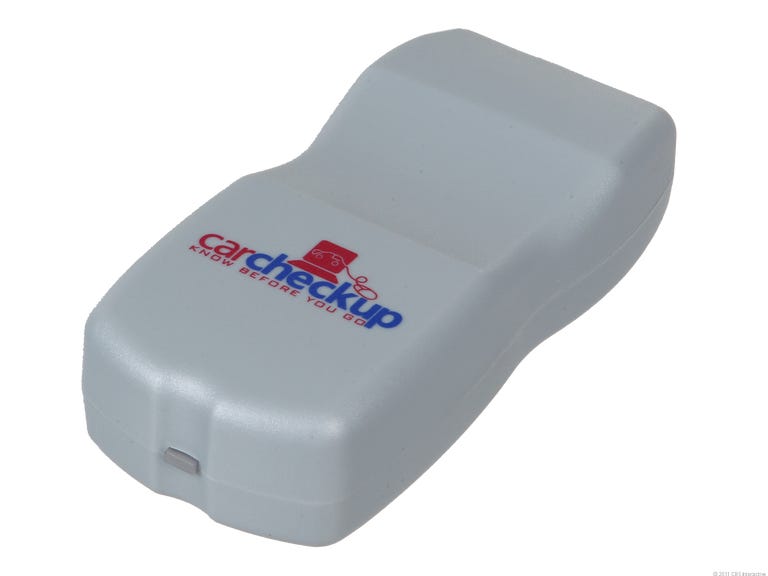A car's trip computer often includes useful information such as range to empty and average fuel economy, but for those who want to dig deeper, CarCheckup logs a variety of running information, from engine speed to throttle position to ignition-timing advance.
The Good
The Bad
The Bottom Line
CarCheckup's CarCheckup System is an OBD2 logger, a class of device that reads running data from a car's Onboard Diagnostics port. Auto mechanics use sophisticated OBD2 scanners to diagnose engine problems, but CarCheckup is designed for the car owner. It will log data for each trip, from when you hit the ignition to when you turn the car off, showing detailed data and graphs on a home PC.
Design
There are two components to the CarCheckup System, a logger device and an online data reader. The 5-inch-long, ugly gray device ends in a plug meant to be fitted into the OBD2 port in a car. That port will be under the dashboard or somewhere else in the cabin, near the engine, depending on the car's manufacturer.
The CarCheckup device's length and size make it easy to grip, so plugging it into the OBD2 port should be no problem. But its length also means it might be a hazard for the knees of the driver or passenger, if the OBD2 port is placed on the side of the footwell, for example.
The device also has a USB port on a swing-out arm, which makes it easy to plug into a computer when you remove the device from the car. It would be better if the USB port were an integrated thumbdrive which could be removed from the logger, so you would not have to remove the entire device from the OBD2 port. A USB thumbdrive could easily hold all the data from the car, and would be more portable.

To read the data on the device, you must go to the CarCheckup Web site. Once you log in, the site presents a clean look with tabs for your profile, for uploading data to the site, and for keeping track of business usage.
The profile page lets you select one of your saved vehicles, showing its recorded trips in a drop-down menu. When you select a trip page, the site presents a new set of tabs, including a trip summary, trouble codes, and graphs. From this page, you can select other recorded trips from that day, but you have to go back to the main profile page to select trips from different days.
Features
The CarCheckup logger device itself if very simple, with just the OBD2 plug for hooking it up to a car and the USB port for connecting it to a computer. When you plug it into a computer and go to the CarCheckup Web site, you can choose to upload any new data. As the system is Web-based, there is no need for special software on the computer, although the site requires Internet Explorer.
The CarCheckup Web site lets you save multiple cars in your profile. The first car is free, but each successive car costs $25 to add.
A fuel expense feature lets you record each fill-up for a given car, and can generate a report which can be exported to Excel. This feature integrates with the business mileage tracker, making it easy to bill clients or companies.
The trip summary for each driving segment shows how many miles were covered, and breaks down how much time was spent traveling at different speeds. It also shows trouble codes and the number of instances of hard braking or acceleration. This latter feature can serve as an eco coach or as a way for parents to monitor their children's driving habits.

The Advanced Data feature lets you choose a variety of information to display in a chart or graph. It covers data points such as speed, intake air temperature, and throttle position. But the site offers not export tools for the Advanced Data.
The CarCheckup Web site also does not have a section that focuses on fuel economy, something many people would want to monitor. There are also no tools for comparing data over a period of time, making it difficult to watch for failing performance.
And while the site shows trouble codes logged by the CarCheckup device, it cannot be set to clear them.
Performance
The CarCheckup device generally works as advertised. It sat innocuously in the car as we made a variety of trips. Once removed, its USB connection plugged into our computer. After logging in to the CarCheckup Web site, we uploaded the data.
But the Web site was slow and frequently unresponsive, and took a while to process the data and create reports. Even switching from tab to tab on the site took a while. Clicking around the site, we had to wait for pages to build.
In sum
The $149.97 price tag on the CarCheckup System may seem pricey, but most OBD tools sell for comparable prices or more. However, many come in more convenient designs and have more advanced features. CarCheckup offers a lot of useful data from a car's computer, and should satisfy obsessive data analysts, but the lack of tools for comparing past and current performance limits the device's usefulness, and not providing fuel economy performance analysis is a big miss.



